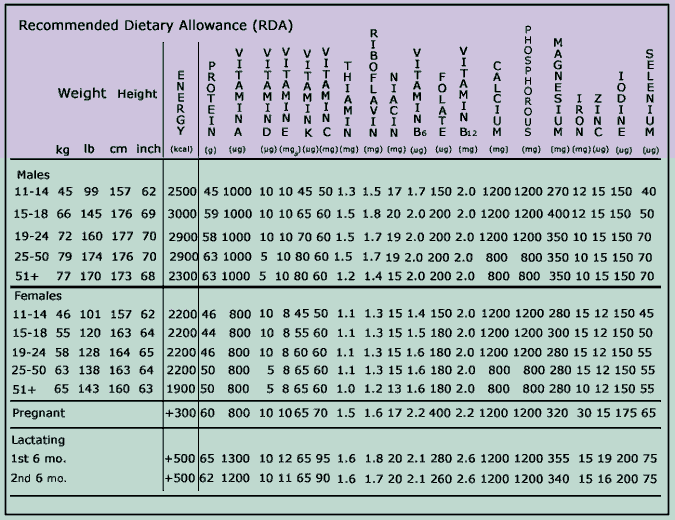Pajaro Street Health and Wellness
Quick Links: PUBLISHING/BOOKS FOOD&WINEART HEALTH & WELLNESS
TRAVEL
Sites: pajarostreet.com psgrill.net artbz.bz digitalartdepot.com
Quick Links: Health Home Encyclopedia diet Sleep Exercise Disease&Stress Health Links
Recommended Dietary Allowance (RDA) the amounts of selected nutrients considered adequate to meet the known nutrient needs of healthy people. The RDA are based on scientific knowledge and have been presented by a committee of the Food and Nutrition Board (FNB) of the National Academy of Sciences (NAS). The Canadian equivalent is the Recommended Nutrient Intakes. RDA is generally accepted throughout the world as a valid source of information. At least 40 different nations have as well as organisations have published standards similar to the RDA.

"Despite the fact that RDAs have proved useful, most physicians and laypeople tend to assign more meaning to RDA standards than they should. This is due in part to the U.S. government's requiring that all food and supplement labels give their percentages according to the RDAs. But after spending the past several years learning about nutritional supplementation and its effect on chronic degenerative diseases, I have become convinced of one overriding truth: RDAs have absolutely nothing to do with chronic degenerative diseases.
I believe this one simple truth is the cause of more confusion about the health benefits of nutritional supplementation than any other fact. Physicians are trained to believe that the RDAs are the level of nutrients that are needed by the body for optimal health. This false assumption is the main reason I believe physicians, registered dietitians, nutritionists, and the health-care community in general show such resistance to nutritional supplementation.
As you search the medical literature about oxidative stress and the amount of nutrients needed to prevent it, the level of nutritional supplementation is significantly greater than RDA levels. A good example of this is vitamin E. The recommended daily allowance of vitamin E is 10 IU, and in some schedules as high as 30 IU. The average American diet contains 8-10 IU. According to medical literature, you do not begin to see any health benefits until ingesting 100 IU of vitamin E in supplementation. This health benefit seems to improve all the way up to 400 IU and even higher. (Most physicians who understand supplementation would agree that one must consume at least 400 IU of vitamin E daily.)
The RDA for vitamin C is 60 mg, even though discussions over the past few years suggest this needs to be increased to 200 mg daily. The medical literature, on the other hand, indicates that our bodies need at least 1,000 mg of vitamin C before health benefits result. This benefit improves even more as we reach 2,000 mg.
I could go through all the major nutrients and list the optimal levels shown to provide health benefit in the medical literature. In each case there is no relationship to the RDAs. Again, recommended daily allowances have nothing to do with chronic degenerative diseases. To get an idea of how much food we'd need to consume in order to achieve these optimal levels of nutrients, see Table below.
Amount of Food Needed to Achieve these Optimal Levels of Nutrients
Vitamin E (450 IU)
33 heads of spinach
27 pounds of butter
80 medium avocados
80 mangos
2 lbs. of sunflower seeds
23 cups of wheat germ
1.5 quarts of corn oil
Vitamin D (600 /U)
22 large egg yolks
6 cups of fortified milk
30 tablespoons of margarine
15 ounces of shrimp
Vitamin C (1300 ma)
17 medium kiwifruit 16 medium oranges
160 medium apples (including the skin)
10.5 cups of fresh orange juice
16 cups of raw chopped broccoli
Folate (1 ma)
3.8 cups of cooked asparagus
4 cups of black beans
20 medium oranges
10 cups of brussel sprouts
3.8 cups of cooked spinach
Vitamin B6 (27 ma)
41 medium bananas
38 medium baked potatoes with skin
77 cups of lentils
15 lbs. of chicken breast
18 cups of wheat germ
Riboflavin (27 ma)
22 ounces of beef liver
16 cups of low-fat yogurt
9 dozen eggs
3.25 gallons of low-fat r
64 cups of cooked spinach
Thiemin (27 ma)
135 cups of brown rice
2 lbs. of ham
3 lbs. of sunflower seeds
64 cups of green peas
12 cups of wheat germ
There is simply no way to achieve these optimal levels of nutrients through food. If you desire to decrease your risk of developing a chronic degenerative disease, you must supplement your diet."
"What Your Doctor Doesn't Know About Nutritional Medicine May Be Killing You."
Dr. Ray Strand http://www.raystrand.com/bookstore.asp